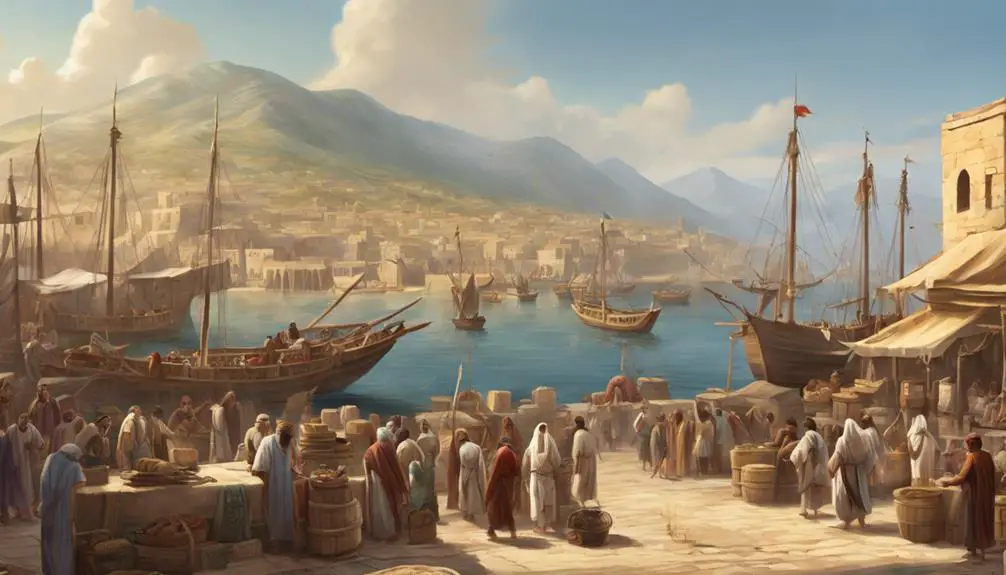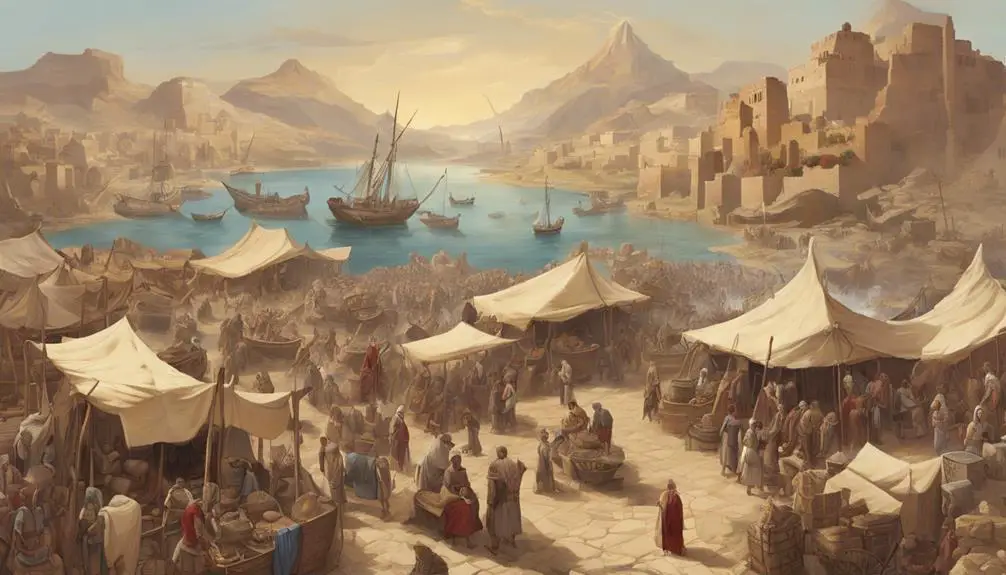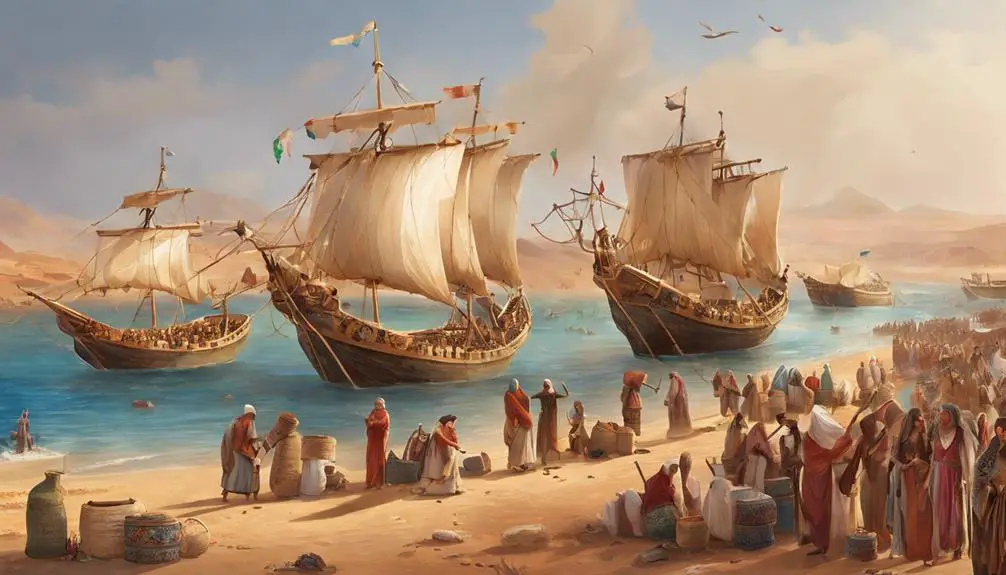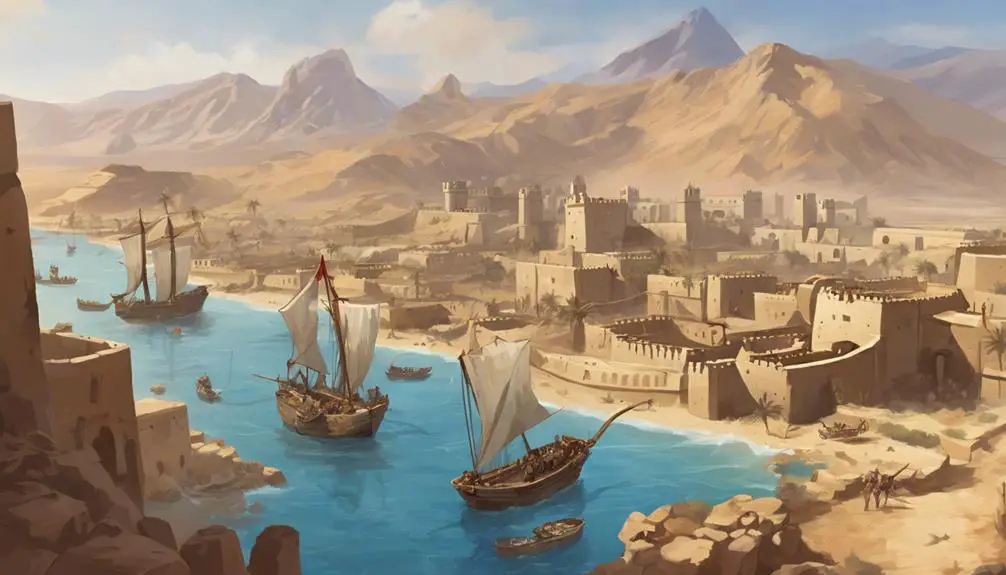Discover the ancient city of Elath in the Bible, a crossroads of trade, conquest, and faith that shaped history and intrigues to this day.

Elath in the Bible
Have you ever pondered the sands of time and how cities like Elath have witnessed the ebb and flow of history?
Nestled in biblical narratives, Elath's strategic location made it a hub for trade and military campaigns, offering a unique lens through which to view ancient geopolitical dynamics.
Beyond its material significance, Elath also embodies spiritual symbolism, its stories woven into the fabric of faith and tradition.
As you explore its historical significance and roles, you'll uncover layers of meaning that invite further contemplation on its impact on both the ancient world and its echo in modern times.
Key Takeaways
- Elath's strategic location made it a crucial maritime trade access point in biblical narratives.
- The city's repeated conquests and reconstructions highlight its fortified and coveted nature in the Bible.
- Biblical references to Elath deepen understanding of its economic and geopolitical significance in ancient Near East history.
- Elath's multifaceted role in the Bible underscores the interplay of geography, economy, and divine symbolism in biblical history.
Historical Significance of Elath

Elath's strategic location at the northern tip of the Gulf of Aqaba played a pivotal role in the ancient trade routes, significantly impacting the economic and political landscapes of the surrounding regions. Its geographical location, nestled between continents and seas, made it a crossroads of civilizations, where cultures, goods, and ideas met and merged. This not only enriched Elath but also made it a coveted prize for empires and kingdoms, leading to its historical significance that resonates through archaeological findings.
You'll find that archaeological excavations in Elath have unearthed artifacts and structures that speak volumes about its past. These findings provide a tangible connection to the narratives recounted in historical and biblical texts, offering a multidimensional picture of its role and importance. From pottery that hints at trade connections with distant lands to inscriptions that shed light on the political dynamics of the era, each piece contributes to a greater understanding of Elath's place in history.
Moreover, the strategic importance of Elath is underscored by its fortifications and buildings, which reflect both the wealth it garnered through trade and the necessity of defending such a valuable asset. Through these archaeological insights, you grasp the true significance of Elath's geographical location, not just as a point on a map, but as a hub of ancient human activity and achievement.
Elath's Role in Trade

Understanding the historical significance of Elath sets the stage for exploring its pivotal role in ancient trade networks, where its strategic location facilitated the exchange of goods and ideas across continents. Elath's prime positioning along the northern end of the Red Sea was crucial for accessing maritime routes that connected the East and the West. This port city served as a bustling hub where traders from distant lands converged, making it a linchpin in the economic and cultural exchange that shaped the ancient world.
- Maritime Routes: Elath's access to key sea lanes enabled the flow of luxury goods, spices, and raw materials.
- Architectural Remnants: The city's ruins bear testimony to its wealth and importance, with structures reflecting a blend of influences from various civilizations.
- Economic Hub: It wasn't just a point of transit but also a center where goods were processed and value was added.
- Cultural Exchange: The diverse array of traders and travelers passing through Elath contributed to a rich tapestry of cultural interactions.
The city's role in facilitating trade can't be overstated. Through its ports, Elath linked continents, playing a critical part in the development of the ancient world's economy and the spread of ideas and innovations.
Biblical Narratives Featuring Elath

In biblical narratives, Elath emerges as a significant locale, reflecting its historical and strategic importance in ancient trade and geopolitical affairs. Its geographical location, nestled at the northern tip of the Red Sea, positions it as a pivotal access point for maritime trade routes extending into the Arabian Peninsula and beyond. This not only underlines Elath's role in the ancient economy but also its allure for various empires and kingdoms documented throughout biblical history.
The architectural features of Elath, though not described in meticulous detail within the scriptures, are hinted at through its repeated conquests and reconstructions. You can infer its fortified nature, designed to protect its valuable trade and serve as a military outpost. Its ports, implied to be bustling with activity, would have been engineered to accommodate the era's trading vessels, further emphasizing its economic significance.
Analyzing these elements, you grasp the multifaceted role of Elath in biblical narratives. It wasn't merely a backdrop for historical events; rather, it stood as a testament to the interplay between geography, economy, and power in the ancient Near East. Its mention within the scriptures invites a deeper understanding of how such locales influenced the course of biblical history, shaping the narratives we study today.
Military Campaigns and Elath

Throughout history, Elath served as a focal point for numerous military campaigns due to its strategic and economic significance. Its coastal location made it a crucial asset for controlling trade routes and launching naval engagements. You'll find that the narratives surrounding Elath provide a profound understanding of ancient warfare, especially in terms of how battles were fought and territories were defended.
Let's delve into some key aspects that highlight Elath's military history:
- Fortification Techniques: Advanced fortification methods were employed to protect Elath from invading forces. These included towering walls and strategically placed watchtowers to offer early warnings of approaching enemies.
- Naval Engagements: The port's geographical position made it an ideal stage for naval battles. Its fleets played significant roles in controlling maritime trade routes and in defense strategies against seaborne invasions.
- Tactical Alliances: Rulers often sought alliances with Elath to secure their trade interests and to bolster their defense mechanisms against common foes.
- Siege Warfare: Elath witnessed several sieges throughout its history, showcasing the evolution of siege techniques from battering rams to more sophisticated engineering tactics intended to breach its fortifications.
Analyzing Elath's military campaigns offers invaluable insights into the complexities of ancient warfare, emphasizing the significance of location, alliances, and technological advancements in shaping the outcomes of battles.
Spiritual Symbolism of Elath

Beyond its military prowess, Elath also embodies profound spiritual symbolism within the context of biblical narratives, serving as a testament to the intricate interplay between physical territories and their theological significance. This port city, often mentioned in Scripture, isn't just a location on the map; it's a rich source of divine metaphors and sacred geography, reflecting the spiritual journey of God's people.
You'll find that Elath's strategic position and economic significance are mirrored in its spiritual role. Just as this city was a gateway for commerce and interaction with the outside world, it similarly represents a portal to understanding deeper spiritual truths. The narratives surrounding Elath in the Bible highlight how physical conquests and losses parallel spiritual victories and defeats, underscoring the belief that the physical and spiritual realms are interconnected.
Moreover, Elath's inclusion in sacred texts underscores its role as a symbol of divine provision and protection. Its history of changing hands between nations serves as a reminder of God's sovereignty over all lands and peoples. In this light, Elath transcends its geographical importance, embodying a divine metaphor for God's unyielding presence and guidance amidst the shifting sands of time and the tumult of history.
Frequently Asked Questions
What Are the Archaeological Findings Related to Elath, and How Do They Contribute to Our Understanding of Its Cultural Context?
You're diving into the archaeological discoveries related to Elath.
Focusing on Elath inscriptions and pottery dating is pivotal as they shed light on the intricate cultural framework of the area.
The inscriptions offer a direct glimpse into historical communications and societal norms.
Pottery dating helps to establish a chronological timeline, enriching our understanding of the cultural and historical landscape surrounding Elath.
This analytical approach reveals the depth of Elath's heritage.
How Has the Modern Interpretation of Elath's Role in Ancient Societies Changed With Recent Historical and Theological Scholarship?
You've probably noticed that recent historical and theological scholarship has shifted how you understand Elath's significance. This evolution stems from fresh scriptural interpretations and heated theological debates, offering a more nuanced view.
Now, it's clear Elath played a pivotal role in shaping ancient societies, far beyond its initial portrayal. This change in perspective enriches your appreciation of its historical and cultural impact, highlighting the complexity of interpreting ancient texts and artifacts.
Are There Any Lesser-Known Myths or Legends From Neighboring Civilizations That Mention Elath, and How Do They Compare With the Biblical Accounts?
You're diving into the intriguing realm of myth comparison, looking at neighboring legends that reference Elath. These stories, often overshadowed by their biblical counterpart, offer a rich tapestry of cultural and historical insights.
By analyzing how these narratives align or diverge from the biblical accounts, you're uncovering layers of ancient perceptions and interactions.
This scholarly approach not only broadens your understanding but also highlights the complexity of ancient civilizations' interconnected stories.
How Did the Climate and Geography of the Elath Region Influence Its Economic and Political Development Throughout History?
The climate and geography of the Elath region significantly shaped its economic and political development. Its strategic location along vital trade routes made it a hub for commerce, fostering wealth and power.
The harsh desert climate necessitated innovative approaches to desert agriculture, ensuring survival and prosperity. This combination of trade centrality and agricultural ingenuity allowed Elath to exert a lasting influence on the region's economic and political landscapes.
What Is the Significance of Elath in Contemporary Religious Practices or Pilgrimage Traditions, if Any?
You're looking into Elath without focusing on its biblical roots. Instead, you're examining its role in modern religious practices or pilgrimages.
Elath isn't widely recognized for significant contemporary religious tourism or as a site of pilgrimage today. It lacks prominent spiritual symbols that typically attract such activities.
However, any relevance it holds in current religious contexts might stem from historical or cultural significance rather than being a central destination for spiritual practices.
Conclusion
In your exploration of Elath, you've uncovered its multifaceted role in biblical history. This port city wasn't only pivotal in trade, enriching the region's economies, but also stood at the heart of numerous military campaigns, underscoring its strategic importance.
Through biblical narratives, Elath emerges as more than a geographical location; it's imbued with spiritual symbolism, representing the intersection of divine providence and human endeavor.
Your analysis reveals Elath as a testament to the complex interplay between economic, military, and spiritual dimensions in biblical times.



Sign up